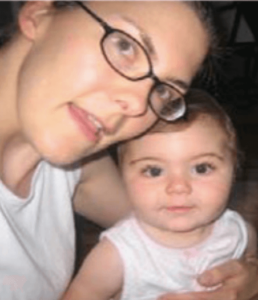01 Aug Picking Up the Pieces

By Beth Adamo, SUDC parent of Natalie (07/29/05 – 03/18/07)
The only thing in life that’s certain is that nothing is certain. Things can change in a heartbeat: a sudden car crash, an accidental drowning, an act of violence, a terminal disease. When someone we love dies, nothing is ever the same again.
For me, this painful fact of life hit hard on the morning of March 18, 2007, when I went to check on my 19-month-old daughter, Natalie. Expecting to find her just waking up from a peaceful night’s sleep, to my absolute horror, I found her cold, lifeless body. There were no warning signs, no explanation for how a perfectly healthy child could just stop breathing. Suddenly, my life as I knew it was over, and a new life – a life permeated with grief – had begun.
Since that dreadful March day, I have searched – for understanding, for help, for comfort, for ways to cope with my terrible loss. I’ve read books about grief. I’ve talked with professional therapists, and I’ve listened to others who are grieving. Here’s what I’ve learned along the way.
Everyone grieves differently. To grieve is universal, but everyone grieves in their own personal way. “People who are grieving need reassurance that what they are experiencing is normal,” says Christine Miller, Bereavement Field Coordinator at Beacon Hospice. There are a lot of factors that play into how we all deal with grief. “You look at the nature of the relationship with the deceased (was it a child, a spouse?), their death (was it sudden, accidental, suicide, homicide?), an individual’s personality, experience, and concurrent stressors in their life.”
Depending on the circumstances, some people may experience complicated grief, which is a more intense and prolonged grief reaction. “In these cases, symptoms haven’t lessened or may have grown worse over time,” says Miller. For people experiencing complicated grief, it’s especially Beth and daughter Natalie important to get professional help. Time loses its normal sense of order. Something can happen – a smell, a sound, a touch – to trigger your grief, and it suddenly comes flooding back even years later. And through it all, there is an unrelenting sadness that has become part of your life. It is the ‘new normal.’”
Grief does not just go away. You won’t wake up one day and be “over it.” Your loved one is still gone and her place in your heart will always be there. “Part of the healing process is learning how to emotionally relocate the deceased,” says Miller. This means that you form a new relationship with the memories of your loved one. You won’t ever forget, but you will be able to find happiness again. Like it or not, life does go on. It may be hard to accept the fact that the rest of the world keeps on going, especially in the beginning. A driver who cuts you off in traffic doesn’t know about your loss. Innocent, everyday questions like, “How are you?” can leave you tongue-tied. Sometimes it’s all you can do to just keep breathing. To function in the world requires you to put on a brave face, what some people refer to as “the mask.”
You are not alone. Although your grief is all yours, you do not have to, and you should not, walk the journey alone. Here are strategies for coping:
- Be easy on yourself, emotionally and physically.
- Try to educate your friends about how they can help. (See “What Can I Do?”)
- Consider attending a peer support group or seeing a professional counselor.
- Find what comforts you. It could be creating a memorial website or garden, starting a charitable foundation, taking up painting, or writing in a journal.
- Do things when you’re ready. There is no timetable for grief.
- Keep in mind there is no right or wrong way to grieve – only your way.
Of love and loss. In the years since my daughter died, I have had good days and bad days. Such is the nature of grief and I have learned to live with it. Alfred Lord Tennyson aptly wrote, “Tis better to have loved and lost than never to have loved at all.” I am forever grateful that Natalie was a part of my life. I wouldn’t trade that for anything.
What Can I Do? When someone you know is grieving, it’s natural to help. But, it’s hard to know the right thing to say or do. While a loaf of banana bread is always welcome, here are more ways you can support someone who is grieving:
- “Don’t try to give advice,” says Miller. “Just say you’re sorry, listen, and be there.”
- Avoid offering easy answers or platitudes, like, “He’s in a better place.” Or “Everything happens for a reason.”
- Do not judge or comment on the way your friend is grieving.
- Be mindful of holidays, birthdays, anniversaries, and other markers of time that may be especially difficult.
- Understand that grief has no time limit.
- Don’t be afraid to talk about the deceased or say his or her name. One of the greatest comforts comes from knowing that a loved one is remembered.



